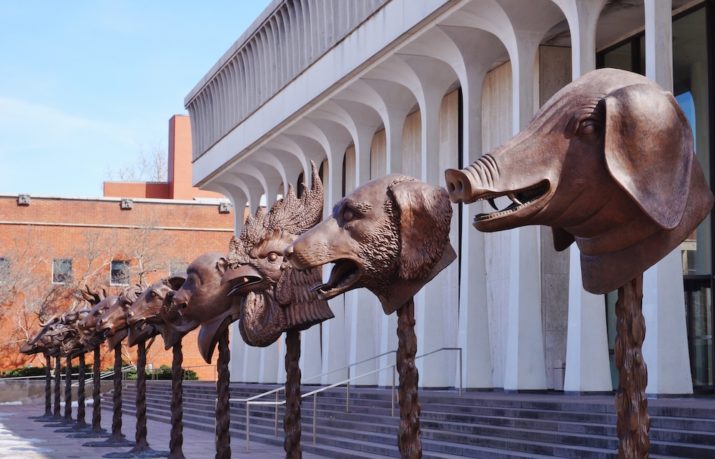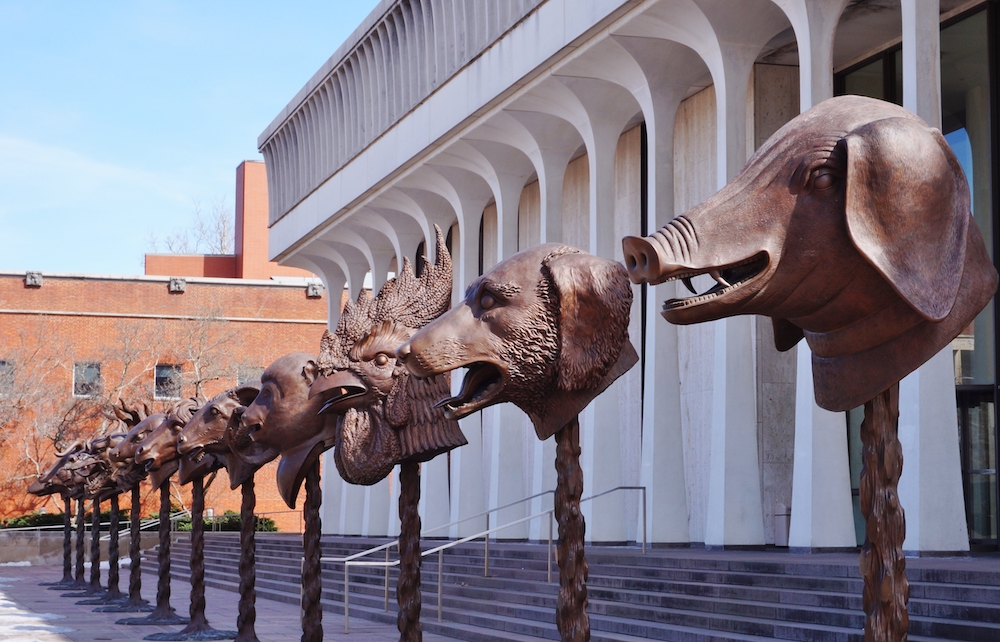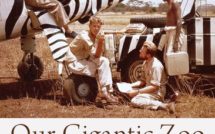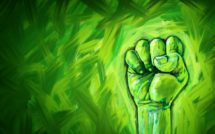

This is part of our special feature, Rethinking the Human in a Multispecies World.
In this section of Campus, EuropeNow features a selection of scholarly articles and books on topics pertinent to the teaching of Europe or teaching in Europe that were published within the last 5 years. This dynamic bibliography, with monthly installments, seeks to highlight both pedagogy research as well as critical analyses of debates taking place in higher education in and about Europe.
If you are interested in reviewing any of the books featured in any of our Campus Round-Ups, please contact our Research and Pedagogy Chair, Hélène Ducros, at helene@alumni.unc.edu
1. Place-Responsive Pedagogies in the Anthropocene: Attuning with the More-than-Human
By Jonathan Lynch and Greg Mannion
Abstract: Drawing on New Materialist frameworks for environmental and sustainability education, we extend and deepen our understanding of contemporary place-responsive pedagogies in the light of our human-impacted geological epoch, the Anthropocene, and its allied environmental concerns. Empirically, in a new and original way, we explore the role of the more-than-human in educators’ planning and enactment of place-responsive pedagogies. We show that place-responsive pedagogies are derived from ongoing attunements reciprocally made by all participants to each other – educators, learners, and the more-than-human – and between the place of learning and these participants. Findings show that these attunements emerge from socio-environmental processes and features of a place, but this article also shows the critical importance of (i) what educators and learners are able to notice and respond to, (ii) how educators choose to build upon this noticing and response-making, and (iii) how they actively incorporate the agencies of the more-than-human into teaching and learning. Wider implications for researching environmental and sustainability education are considered.
Find the article in Environmental Education Research here.
2. Crafting Pedagogical Pathways that Disrupt and Transform Anthropocentric Mindsets of Higher Education Students
By Tanja Tillmanns and Charlotte Holland
Abstract: A key challenge in education for sustainable development is in enabling learners to critically review and re-orient anthropocentric (human-centric) perspectives on sustainability. Sustainability challenges are complex and fluid, and demand non-human centric thinking in constructing viable solutions. The purpose of this study was thus to explore how disruptive pedagogical interventions could be used to challenge and transform anthropocentric mindsets of higher education students. The guiding framework for these pedagogical interventions was transformative learning, which translated into exposure to disorienting dilemmas, followed by individual reflection and subsequent engagement in rational discourse on key sustainability themes. A series of ‘visual cues’ (comprising of disruptive imagery and critical questions) were designed to provoke participants to think more critically about human centric world-views and the interconnectedness, multiplicity and heterogeneity of sustainability. Through the use of Constructivist Grounded Theory, a framework of four conceptual categories emerged, namely, ‘Emotional/cognitive disjuncture’, ‘Recognising principles, practices and themes of sustainability’, ‘Critiquing concepts and contexts of sustainability’ and ‘Reorienting dispositions/perspectives for sustainability’. This framework represents key elements within the process of becoming sustainability [re]oriented, and ultimately provided the evidence that the disruptive pedagogical framework underpinning these visual cue interventions has been effective in moving learners beyond anthropocentric views of the world, and thus, can be used to support learners in becoming sustainability [re]-oriented.
3. Non‐Human Animals and Educational Policy: Philosophical Post‐humanism, Critical Pedagogy, and Ecopedagogy
By Kai Horsthemke
Abstract: Questions about the conscious, conative and cognitive life, as well as the status and treatment of other‐than‐animals have been receiving systematic consideration by philosophers for close to 50 years. It is all the more puzzling, then, that it is only in recent years that these issues have been addressed by educational philosophers and scholars of moral education, the focus being mainly on the eating of animals. This essay examines some of the approaches that have been suggested for including the ethical treatment and moral status of animals as an urgent concern within educational policy, pedagogy and teaching and learning generally.
Find the article in the Journal of Philosophy of Education here.
4. Posthumanism and Higher Education: Reimagining Pedagogy, Practice and Research
By Carol A. Taylor and Annouchka Bayley (Eds.)
Abstract: This book explores ways in which posthumanist and new materialist thinking can be put to work in order to reimagine higher education pedagogy, practice and research. The editors and contributors illuminate how we can move the thinking and doing of higher education out of the humanist cul-de-sac of individualism, binarism and colonialism and away from anthropocentric modes of performative rationality. Based in a reconceptualization of ontology, epistemology and ethics which shifts attention away from the human towards the vitality of matter and the nonhuman, posthumanist and new materialist approaches pose a profound challenge to higher education. In engaging with the theoretical twists and turns of various posthumanisms and new materialisms, this book offers new, experimental and creative ways for academics, practitioners and researchers to do higher education differently. This ground-breaking edited collection will appeal to students and scholars of posthumanism and new materialism, as well as those looking to conceptualize higher education as other than performative practice.
Find the book at Palgrave Macmillan here.
5. Education for Total Liberation: Critical Animal Pedagogy and Teaching Against Speciesism
By Anthony J. Nocella II, Carolyn Drew, Amber E. George, Sinem Ketenci, John Lupinacci, Ian Purdy and Joe Leeson-Schatz (Eds.)
Abstract: Education for Total Liberation is a collection of essays from leaders in the field of critical animal pedagogy (CAP). CAP emerges from activist educators teaching critical animal studies and is rooted in critical theory as well as the animal advocacy movement. Critical animal studies (CAS) argues for an interdisciplinary approach to understanding our relationships with nonhuman animals. CAS challenges two specific fields of theory: (1) animal studies, rooted in vivisection and testing on animals in the hard sciences and (2) human-animal studies, which reinforces a socially constructed binary between humans and animals and adopts abstract theoretical approaches. In contrast, CAS takes a progressive and committed approach to scholarship and sees the exploitation of nonhuman animals as interrelated with oppression of humans based on class, gender, race, ability, sexuality, age, and citizenship. CAS promotes the liberation of all animals and challenges all systems of domination. Education for Total Liberation is appropriate for undergraduate and graduate level readers (and beyond) who wish to learn from examples of radical pedagogical projects shaped by CAS and critical pedagogy.
Find the book at Peter Lang here.
Published on November 9, 2021




